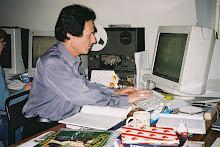Another great read that will make you think about how manipulated we are by the media is Walking Shadows: Orson Welles, William Randolph Hearst, and Citizen Kane, by John Evangelist Walsh (The University of Wisconsin Press, 2004), an independent scholar and writer. I started and finished it almost without putting it down a few weeks ago.
Walsh is an American author of almost twenty works of biography and history: The Execution of Major Andre; Unraveling Piltdown: The Science Fraud of the Century and Its Solution; Midnight Dreary: The Mysterious Death of Edgar Allan Poe, among others. For more information about him, go to http://us.macmillan.com/moonlight.
Like most of us, I've seen Citizen Kane, but a long time ago, and must admit that I couldn't really understand why that movie could be so controversial, since I didn't live back then. Walsh even explains the significance of the word "Rosebud." Bet you can't guess what it is.
What I had no idea about was the power of William Randolph Hearst who was challenged by the genius of Orson Welles.
John Walsh puts the whole movie in historical context in a highly-readable way.
Hearst began his newspaper career in 1887 when he received, as a gift(!) from his father, no less, the San Francisco Examiner, at the age of 24. Hearst had just been expelled from Harvard, so rewarding bad behaviour is really nothing new.
According to Walsh, "he soon turned the respected old journal from legitimate reporting to a career of sensationalism. Solely for the sake of circulation he adopted and improved on every low trick and technique of the day's 'yellow journalism.' A frothy blend of exaggeration, distortion, excess, and outright fakery became the Examiner's hallmark --- scandal, pseudo-science, disasters, an undercurrent of sexual innuendo, all wrapped in a variety of noisy 'crusades' on behalf of a vague entity called 'the people'."
His mother bought the New York Journal for him. Hearst then wasted no time acquiring other papers and made them into one of the first chains in the US.
But catch this. In 1906, Theodore Roosevelt said of Hearst, "'He preaches the gospel of envy, hatred, and unrest. ... He cares nothing for the nation nor for any citizen in it. ... He is the most potent single influence for evil we have in our life.'"
Time magazine said the same thing about him 33 years later: "No other press lord wielded his power with less sense of responsibility; no other press matched the Hearst press for flamboyance, perversity and incitement of man's hysteria. ... His appeal was not to men's minds but to those infantile emotions which he never conquered in himself: arrogance, hatred, frustration, fear."
Did you know that Hearst is blamed for bringing on the Spanish-American War over Cuba in 1898? The public was brainwashed into accepting it.
Even worse, according to Walsh: "Most chilling of all was his role in the assassination of President McKinley in 1901, a role which earned him fierce public condemnation, and from which he recovered only with great difficulty. Always a bitter opponent of McKinely, editorials in Hearst's papers against the president and his policies grew increasingly savage in tone until they actually encouraged the idea of assassination. 'If bad institutions and bad men cannot be got rid of except by killing,' counseled an editorial in the New York Evening Journal on McKinley's reelection, 'then the killing must be done.'"
Pravda and Izvestia, move over. Who needs the CIA or the KGB?
Does any or all of this remind you of what we're living through today? A Canadian media baron brought to trial in Chicago, then jailed in Florida. Wars in the Middle East supported and distorted by so much press, embedded journalists, TV, and nowadays the Internet, that it's been almost impossible to sift fact from fiction to form an opinion.
If we limit our research to just one source of information, we cannot help but be manipulated by what we're reading. Independent thought can only come from reading and listening to different sources before we can draw any conclusions - all the more reason for a "blended approach" when it comes to learning.
For a bit of levity in this debate, try Susan Townsend's Adrian Mole and the Weapons of Mass Destruction (Adrian Mole Diaries). You'll laugh. You'll cry. You'll thank me later...
Subscribe to:
Post Comments (Atom)

No comments:
Post a Comment